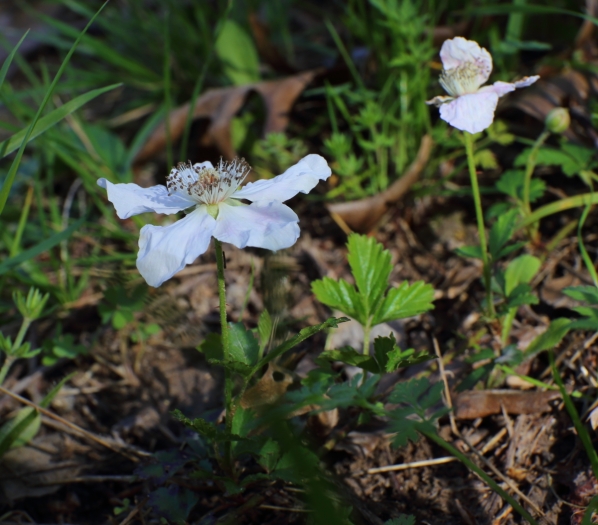Southern Dewberry
(Rubus trivialis)
Southern Dewberry (Rubus trivialis)
/
/

Nick Mirro
CC BY 4.0
Image By:
Nick Mirro
Recorded By:
Copyright:
CC BY 4.0
Copyright Notice:
Photo by: Nick Mirro | License Type: CC BY 4.0 | License URL: http://creativecommons.org/licenses/by/4.0/ | Rights Holder: Nick Mirro | Publisher: iNaturalist | Date Created: 2016-03-13T04:18:25-07:00 |
























Estimated Native Range
Summary
Rubus trivialis, commonly known as Southern Dewberry, is a perennial herb native to open woodlands, thickets, and clearings across the southern United States and northern Mexico. It is a member of the rose family and is characterized by its trailing, thorny stems that can reach up to 4 feet in length. Southern Dewberry typically grows to a height of 1 foot with a spread that can be several feet wide due to its sprawling habit. From March to April, it produces small, white, five-petaled flowers that are moderately showy, followed by edible blackberries that ripen in late spring to early summer.
Southern Dewberry is valued for its edible fruit, which can be used in jellies, pies, and other culinary applications. It is also appreciated for its wildlife value, as the berries provide food for birds and other animals. In cultivation, it can be used as a ground cover or for naturalizing in wild gardens. It prefers full sun to part shade and requires sandy, well-drained soils. While it is drought-tolerant once established, regular watering will encourage more abundant fruit production. Gardeners should be aware that the plant’s thorns can make it difficult to handle, and it may require regular pruning to keep it in bounds. Additionally, it can become invasive outside its native range, so it is important to check local regulations before planting.CC BY-SA 4.0
Southern Dewberry is valued for its edible fruit, which can be used in jellies, pies, and other culinary applications. It is also appreciated for its wildlife value, as the berries provide food for birds and other animals. In cultivation, it can be used as a ground cover or for naturalizing in wild gardens. It prefers full sun to part shade and requires sandy, well-drained soils. While it is drought-tolerant once established, regular watering will encourage more abundant fruit production. Gardeners should be aware that the plant’s thorns can make it difficult to handle, and it may require regular pruning to keep it in bounds. Additionally, it can become invasive outside its native range, so it is important to check local regulations before planting.CC BY-SA 4.0
Plant Description
- Plant Type: Shrub
- Height: 0.5-1 feet
- Width: 3-6 feet
- Growth Rate: Moderate, Rapid
- Flower Color: Pink, White
- Flowering Season: Spring, Summer
- Leaf Retention: Deciduous
Growth Requirements
- Sun: Full Sun, Part Shade
- Water: Medium
- Drainage: Medium
Common Uses
Bird Garden, Edible*Disclaimer: Easyscape's listed plant edibility is for informational use. Always verify the safety and proper identification of any plant before consumption., Low Maintenance
Natural Habitat
Native to open woodlands, thickets, and clearings
Other Names
Common Names: Dewberry, Trailing Blackberry
Scientific Names: , Rubus trivialis, Rubus carpinifolius, Rubus continentalis, Rubus hispidus, Rubus hispidus subsp. continentalis, Rubus mississippianus, Rubus okeechobeus, Rubus procumbens, Rubus rubrisetus
GBIF Accepted Name: